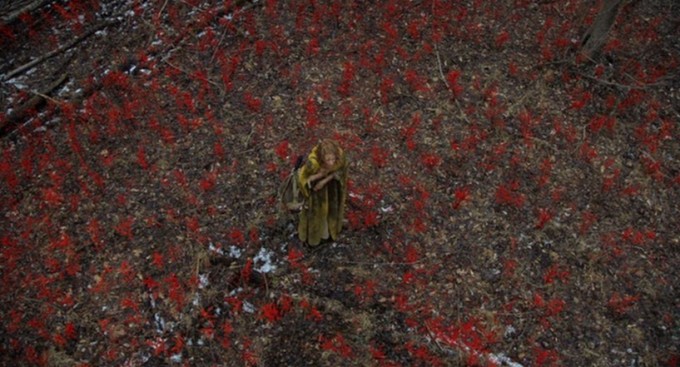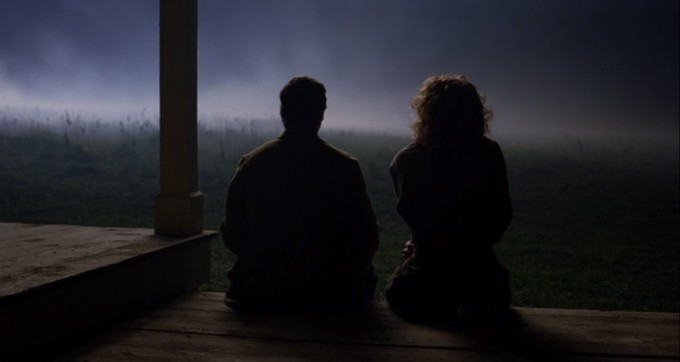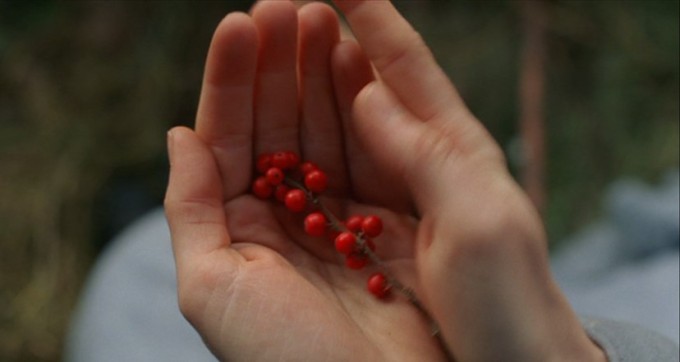Directed by M Night Shyamalan, 2004, 108 minutes
Lucius Fox (Joaquin Phoenix), Ivy Walker (Bryce Dallas Howard) and other inhabitants of the village lead an isolated life within the confines of Covington Wood. Fear of the creatures who inhabit the surrounding woodland keeps villagers from venturing outside their boundary but when an unexpected act of violence threatens their community the village elders must reconsider their seclusion.
M Night Shyamalan’s ‘Sixth Sense’, a modest ghost story with solid performances and a twist ending was a major hit in 1999. He followed with ‘Unbreakable’ (2000) a clever deconstruction of superhero origin stories and then ‘Signs’ (2002) which deftly reconfigured H G Wells’ epic ‘War of the Worlds’ as a domestic drama. By 2004 the novelty of Shyamalan’s narrative trickery was fading, and viewers responded to his films as if they were conjuring turns, judging them simply by the success or failure of their sleight of hand. Despite a strong opening, hostile reviews and adverse audience reaction killed his next film, ‘The Village’ at the box office. A return visit reveals a passionate and thoughtful piece; its nuanced critique of conservative authoritarianism has increased in relevance since its release and the film has grown in stature.
The story of ‘The Village’ bears many similarities to ‘Running out of Time’, a novel by Margaret Peterson Haddix published in 1996 and Shyamalan faced charges of plagiarism but here, as in ‘Signs’ and ‘Unbreakable’ story is secondary. Whether or not the viewer knows or construes the central narrative secret of the ‘The Village’ is unimportant. Shyamalan has much more to offer as he poses some pertinent questions about freedom and social order. Brutally oppressive political regimes make easy villains and we naturally sympathize with those who suffer under their rule, but we all live under varying degrees of social and political coercion, even if the means of control are more subtle. ‘The Village’ challenges us to reconsider our understanding of personal liberty by showing us what might happen if someone created an authoritarian utopia founded on pacifism and compassion rather than violence and bigotry.
Shyamalan was shooting ‘Signs’ when the Twin Towers fell in 2001 but ‘The Village’ is his considered response to America’s spiritual crisis following the terror attacks of 9/11. His film quietly subverts the belief that life was better before we lost our supposed innocence and when we had ‘real’ communities. These comforting but spurious notions find expression in a petty sense of national superiority and the belief that social problems will vanish if we simply close our borders and refuse to let outsiders in. The philosophy of the village foreshadows the self-defeating provincialism of Britain’s vote to abandon Europe and Donald Trump’s simplistic brand of populist conservatism. Communities may seek refuge from violence in retrenchment and isolation, but fear of the world proves a poor foundation for government.
Those who govern the village believe that they have preserved a sense of innocence, but they value their way of life so much that they are willing to sacrifice human life to preserve their community. The population may be controlled as rigorously as any authoritarian state, but it is, superficially, a contented community with little or no dissent. The unsettling tone of Shyamalan’s film depends on his ability to make this closed world so alluring; despite all our misgivings, we want the village to survive. Most of us tacitly harbour some utopian longings and the village offers something to suit every prejudice: Instead of divisive religious fervour the villagers practice a gentle pantheism; there is no racial diversity; marriage and child rearing govern sexuality; the village is self-sufficient so there is no need for money. Young gentlemen playfully test their courage at the village boundary but that represents the limit of their delinquency. The only agent of chaos is Noah Percy (Adrien Brody) whose disquieting presence proves that the village is unable to manage those who cannot conform. Jealousy and rage are impossible to banish or smooth away in even the most placid, compassionate environment.
Life in the village may seem idyllic but fear and grief hide just behind the polite tranquillity: The film begins with a child’s funeral, and we wonder how many more lives have been lost to maintain this way of life. A white lie remains a lie and the deceit at the heart of the village is much darker than a well-meant fib. We may admire the purity of Ivy’s compassion but to save those she loves she must become complicit, albeit unwittingly, in the mendacity of the village elders. She is uniquely placed to preserve the village because she is blind and cannot see what the audience sees. The film is more disturbing because it does not pass judgement on its characters or offer any easy answers to their moral conundrums; instead, it leaves the viewer with much to consider, not least how far we are willing to go to preserve our own quietude whilst surrounded by the suffering of others.
Roger Deakins’ handsome photography lends the film an inviting glow when the village is lit by flickering torches or lamplight, an oasis of domestic comfort in the darkness. In daylight the film takes on the nostalgic tint of sepia photography with the more vivid autumnal shades suppressed, drawing the eye to vivid splashes of red, (‘the bad colour’). Once inside Covington Woods the palette is dominated by drab, pallid hues and damp greys, fungal and decayed. The colour palette meticulously reinforces theme as well as pleasing the eye. ‘The Village’ also features an exquisite score by James Newton Howard graced by Hilary Hahn’s virtuoso violin. Hahn’s playing sighs like an autumn breeze then ripples and flows like a woodland stream. The score complements the films visual style and emotional beats perfectly with startling lurches into occasional discordance. Howard was nominated for an Academy Award for his work in 2004.
As feckless politicians urge us to retreat from the troubles of the outside world and seek refuge in an idealized sense of national identity Shyamalan’s gently radical film demonstrates the inadequacy of such a response: We can never create a society free from threat or change; violence and fear will always find us, as it finds the residents of the village. Freedom requires risk and our response to violent catastrophe offers us the opportunity to evolve and heal. Ignore the avalanche of negative press and rediscover Shyamalan’s finest film.
Quotes
“…she is led by love, the world moves for love; it kneels before it in awe” Edward Walker (William Hurt)
“We are grateful for the time we have been given” Edward Walker (William Hurt)
Connections
Film
‘Company of Wolves’ directed by Neil Jordan (1984)
‘Unbreakable’ directed by M Night Shyamalan (2000)
‘Signs’ directed by M Night Shyamalan (2002)
‘Sauna’ directed by A. J. Annila (2008)
‘November’ directed by Rainer Sarnet (2017)
Reading
Margaret Peterson Haddix, ‘Running out of Time’, Simon and Schuster, 1996



You must be logged in to post a comment.